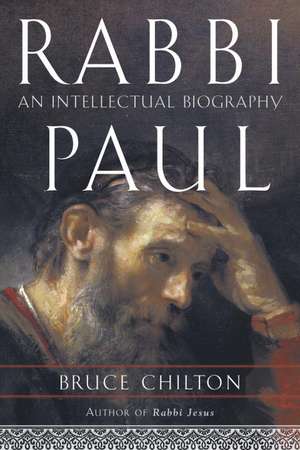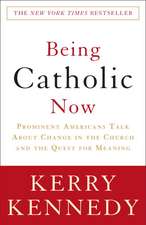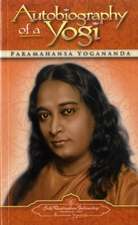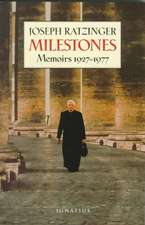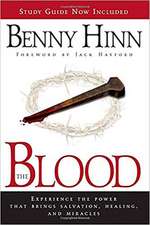Rabbi Paul: An Intellectual Biography
Autor Bruce Chiltonen Limba Engleză Paperback – 31 oct 2005
Without Paul, there would be no Christianity. His letters to various churches scattered throughout the Roman Empire articulated, for the first time, the beliefs that make up the heart of Christian practice and faith. In this extraordinary biography, Bruce Chilton explains the changing images of Paul, from the early Church period when he was regarded as the premiere apostle who separated Christianity from Judaism to more recent liberal evaluations, which paint him as an antifeminist, homophobic figure more dedicated to doctrine than to spiritual freedom. By illuminating Paul’s thoughts and contributions within the context of his time, Chilton restores him to his place as the founding architect of the Church and one of the most important figures in Western history.
Rabbi Paul is at once a compelling, highly readable biography and a window on how Jesus’ message was transformed into a religion embraced by millions around the world. Drawing on Paul’s own writings as well as historical and scholarly documents about his life and times, Chilton portrays an all-too-human saint who helped to create both the most beautiful and the most troublesome aspects of the Church. He shows that Paul sought to specify the correct approach to such central concerns as sexuality, obedience, faith, conscience, and spirit, to define religion as an institution, and to clarify the nature of the religious personality—issues that Christians still struggle with today.
Preț: 106.52 lei
Nou
Puncte Express: 160
Preț estimativ în valută:
20.39€ • 21.20$ • 16.83£
20.39€ • 21.20$ • 16.83£
Carte disponibilă
Livrare economică 25 martie-08 aprilie
Preluare comenzi: 021 569.72.76
Specificații
ISBN-13: 9780385508636
ISBN-10: 0385508638
Pagini: 335
Dimensiuni: 143 x 210 x 20 mm
Greutate: 0.34 kg
Editura: IMAGE
ISBN-10: 0385508638
Pagini: 335
Dimensiuni: 143 x 210 x 20 mm
Greutate: 0.34 kg
Editura: IMAGE
Recenzii
Praise for Rabbi Jesus:
“Bruce Chilton’s masterpiece of religious narrative marks a genuinely new and important step beyond the now-faltering historical Jesus movement.”
—Jacob Neusner, Jerusalem Post
“Open this book and see Jesus as you’ve never seen him . . . This is one heck of a good read. And it left me feeling better than ever about the Jesus we try to serve and follow.”
—National Catholic Reporter
“Engaging and lively . . . Chilton has done an admirable job of taking us into Jesus’ world and witnessing the life of one of history’s most important figures.”
—Charlotte Observer
“Rabbi Jesus is a scholarly pursuit that reads more like a novel. The biography flows with the fluidity of an adventure tale, rich in characters, texture, and detail.”
—The Herald-Sun (Durham, North Carolina)
“Bruce Chilton’s masterpiece of religious narrative marks a genuinely new and important step beyond the now-faltering historical Jesus movement.”
—Jacob Neusner, Jerusalem Post
“Open this book and see Jesus as you’ve never seen him . . . This is one heck of a good read. And it left me feeling better than ever about the Jesus we try to serve and follow.”
—National Catholic Reporter
“Engaging and lively . . . Chilton has done an admirable job of taking us into Jesus’ world and witnessing the life of one of history’s most important figures.”
—Charlotte Observer
“Rabbi Jesus is a scholarly pursuit that reads more like a novel. The biography flows with the fluidity of an adventure tale, rich in characters, texture, and detail.”
—The Herald-Sun (Durham, North Carolina)
Notă biografică
BRUCE CHILTON is the Bernard Iddings Bell Professor of Religion at Bard College in Annandale-on-Hudson and priest at the Free Church of Saint John in Barrytown, New York. He is the author of many scholarly articles and books, including the widely acclaimed Rabbi Jesus.
Extras
1.
TENT-MAKER'S SON FROM TARSUS
Two millennia before Paul, there was Tarsus. His native city lay near the southeast coast of Asia Minor on a fertile plain called Cilicia. Tarsans were famous for a loudmouthed ambition that flaunted exotic festivals for their gods and flamboyant commerce in foreign products. Their city gobbled up immigrant groups such as its Jews and boasted a bustling academy. Pagan, commercial, part Jewish, and philosophical all at the same time, Tarsus was complex and conflicted. Knowing Tarsus is basic to knowing Paul. He mirrored the city that raised him.
To the end of his life, Paul cherished his association with the people he called "kinsfolk": fellow Jews and fellow citizens from the city that had nurtured him from the time of his birth in 7 c.e. In his letter to the Romans he refers to Andronicus and Junia1 (Romans 16:7), Herodion (Romans 16:11), and Lucius, Jason, and Sosipater (Romans 16:21). Their names fit Greco-Roman custom generally, except for Herodion, which recalls the famous Jewish client-king of Rome. By Paul's own testimony, we can say that he identified with the Judaism of the Diaspora and with the fierce pride of his native city.
Commercial Tarsus
The city thrived on markets but produced only a fraction of the merchandise on offer. Trade was the key to the wealth Tarsus had established and would long retain. Still a considerable city in Turkey with a population today of some 150,000, it has six thousand years of history buried beneath its streets. With only half that population during the first century, Tarsus dominated Cilicia. Even Dio Chrysostom, an itinerant philosopher who had little regard for the city, grudgingly admitted it was "the metropolis" (Discourses 33.17, 34.7), the pivot of the regional economy.
Since the Bronze Age, deforestation has exposed the Turkish highlands to wind and water, forces that have silted up flatlands and coasts beneath. Shifting coastlands and riverbeds as well as decimated forests and bare highlands attest to how human beings alter the land they live in. Here, as in Israel, the environment can be modified dramatically without a big change in climate. Centuries of mountain runoff made Cilicia's soil fertile, fit to produce grain and wine and flax. The Cydnus River provided for a city's thirst for water: to drink, to dispose of effluent, to navigate down to the Mediterranean Sea. After all that, abundant supplies were left over for the decorative, cooling fountains that cities all over Asia Minor prized.
Between Tarsus and the coast some ten miles south,2 a natural lagoon made for a protected harbor; that distance helped keep pirates at bay from the city, if not from shipping. The Tarsans enhanced what nature provided, fitting their lake out with docks and an arsenal. That access to the sea was crucial to the city's success: Tarsus occupied a crossroads for international trade. Thirty miles north lay the Cilician Gates, a pass through the Taurus Mountains. These "gates" had begun as a natural formation that provided a rough, narrow trail for trekkers; the Tarsans then carved the pass into a highway through rock, cutting beneath a cliff face--sometimes between five and six hundred feet high--to permit animal-drawn caravans to ply their trade across an otherwise inhospitable range.
This city was a commercial bridge between caravans to the north (where east and west also met by land routes) and shipping to the south. Even without the Cilician Gates, fertile soil and diligence would have provided for Tarsus's survival; with the Gates, Tarsan markets made for wealth, and its people had every reason to take pride in their achievement.
The people of the highlands benefited from Tarsus by trading rugs and tapestries, somewhat as they do today. Their bartering over high-quality carpets was comparable to their Persian and Indian counterparts, but the designs they wove were different. Although some of the high court styles of Greece and Egypt and Persia were imitated, carpets from the Taurus range were renowned for the vivid, primitive designs of a people who resisted assimilation. Abstract symbols in red wool--a diamond with eight limbs and a mandala within, an insect sketched around an inverted triangle--stand for a scorpion, admired because according to myth a scorpion would rather sting itself to death than accept capture or defeat. Whatever its scientific merits, that claim applied more directly to the people of the mountains, who profited from their Greek and Roman masters without actually submitting to them.
The bazaars that sprang up due to trade were polyglot. Merchants came in from the mountains and the sea, some from far afield, setting up their wares under tents. Tent-making firms such as Paul's family ran made a huge profit--providing portable stalls and accommodations, and repairing damage to the canvas and felt that protected a caravan's wagons and to the leather that harnessed its animals. The mountain people spoke their own Cilician language but made themselves understood in Greek and sometimes Latin to the bulk of their clients, the servants of wealthy nobles and Roman colonists. Aramaic was also spoken by the Syrians who traded there as well as by many of the local population from the time of the Persians. Merchants from the Black Sea and Europe also passed through and did their business in Aramaic, Greek, or Latin: whichever worked best. When trade involved not only finished products and handiwork, but silver and lead from the Taurus Mountains as well as iron from Pontic Cappadocia, dealers and customers had every reason to find a way to make themselves understood accurately. Multicultural commerce and haggling surrounded Paul from the time he could speak.
Tarsus had long provided an axis of regional commerce not only for the people of Cilicia, but also for the great empires that had conquered the city. Antiochus the Great had settled two thousand Jewish families from Mesopotamia in the region, providing them with land, tax incentives, and a measure of self-government3 in exchange for their loyalty in this troubled sector of his Seleucid empire.
The Jews formed a civic "tribe" (phule in Greek, not to be confused with the clans of Jacob), comparable to the tribes to which all citizens belonged during the Seleucid and Roman periods. Families such as Paul's enjoyed the rights of citizenship. Seleucid monarchs found that Jews generally made good subjects, loyal to the rulers who assured them civic status and protected them from local hostility. The Romans reinforced the Persian policy when they took power during the first century b.c.e. Jews in the Diaspora prospered because imperial powers sheltered them from the worst of classical anti-Semitism, and they knew where their loyalty was owed.4 Local pretenders to power attracted them no more than local gods did. Their security depended on the rule of imperial law.
Mark Antony bolstered the prospects of Paul's family, and every family of citizens, during a visit to Tarsus when he came east to represent the Triumvirate in 42 b.c.e. He showed his gratitude to a city that had been loyal to Julius Caesar, confirming its autonomy and granting it exemption from Roman taxes. Antony's generosity was stoked by his passion; Tarsus was the site of Cleopatra's famous ride in a barge, in which she sailed up the Cydnus River to meet her paramour, dressed as Aphrodite.5 For the ambitious and often libidinous population of the city, this was Tarsus's finest hour.
Pagan Tarsus
Every year, Tarsus mounted a spectacle for Tarku, the people's favorite god among the many they worshiped
The city was built on Cilicia's swampy coastal plain, drained for agriculture over the centuries. Dio Chrysostom made fun of how far short Tarsus fell from classical norms of civic beauty (Discourses 33.24-30). With its flat landscape and dirty river, Dio Chrysostom accorded Tarsus the kind of respect that Manhattan's young professionals give The Bronx. Tarku more than compensated for that.
Tarsus had passed from Hittite control to Assyrian control (during the ninth century b.c.e.); after that came the Persians (during the sixth century b.c.e.), with their powerful bureaucracy and an insistent policy of speaking Aramaic for official purposes throughout their vast empire. The coming of Alexander the Great in 334 b.c.e. and the dynasty of his general Seleucus that succeeded Alexander preserved many Persian ways, increasingly leavened with Hellenistic art, philosophy, and language. The culture that shaped Paul from the beginning of his life was pagan as well as Jewish; even the Aramaic he learned at home had been imported by the Persians. Greek was the intellectual oxygen of his thought. And when it came to his proud Jewish heritage, cultural memory taught him that Rome was its indispensable guardian.
The Romans had to wrest control of Cilicia from the pirates and local kingdoms that plagued Tarsus during the last years of Persian rule. Rome's firm measures revived the underlying economy of the region; the new rulers had little to do but police the place to enjoy the contribution of loyal, prosperous subjects and citizens. Yet Tarsus never lost its affinity with the Near East; its natives retained their customs and language when foreigners took over the reins of power. Cilician pride was almost as famous as the fine linen that bore the name of their region, and it came out in religious festivals.
Four teenage men held a canopy for the image of their divine hero as they stood on the corners of a garlanded wagon that oxen drew through the streets along the Cydnus River. They sweated under linen tunics in damp, alluvial heat. An effigy of Tarku, handsome as his bearers, stood tall atop a winged lion on this platform inside four poles erected to form a pyramid. Impassive within his palanquin, Tarku paraded through clouds of incense.
Thousands of people made way for their painted god. Forever as young as his bearers, Tarku's feet did not touch the base of the platform: he stood on top of a winged lion with horns.6 He stands there now, on the many coins of Tarsus that have survived to this day, minted with the emblem of a proud city.
The palanquin approached a temple while crowds chanted the god's name. Some people hailed the god as Perseus or Hercules, familiar names in the Hellenistic world that Greek-speakers often applied to the heroic and virile founder-gods of cities in central and eastern Asia Minor. But other enthusiasts--as we know from the same coins that bear Tarku's likeness--spoke Aramaic, calling him Ba'al-Tarz (Lord of Tarsus), a designation from the Persian period, used long after Greek became a lingua franca in the region; still others acclaimed him as Tarku in the primeval language of Cilicia.
Tarku had been the people's god since before time could be reckoned. He wore an Anatolian headdress as he rode standing on his celestial beast, holding a blossoming flower in his right hand and a battle ax in his left, sword and bow case strapped to the same side of his body. He conveyed fertility, protection, the commanding strength of youth. Offspring of a father-god and a goddess, every spring he was carried to his temple, and there he was burned in effigy. As the flames leaped up to heaven in the midst of sacrifice and incense, he became a god, and Tarku's apotheosis--symbolized by an eagle at the apex of his pyramid--brought the promise that the spring planting would be successful, that another year would see Tarsus healthy and prosperous.
The crowd clamored its praise and petitions and hopes and fears to its god. Pleas for rain, for healing, for personal success were mixed with sacrificial chants and cries of local patriotism. Women keened Tarku's approaching immolation, at the same time celebrating his ascension into heaven. Sorrow and festivity, tears and joyful song had joined in this moment long before written or oral memory. Festival unleashed the passion and vitality of a proud people, roused by feasting to make their fortunes the coming year from the soil, from the river, from the mountains, from the marketplace. With the process of his dying, the god lived eternally. He fused death and life in a way comparable to Osiris in Egypt, Dionysos in Greece, Tammuz in Syria.
Some of the women who sang this moment were veiled from head to toe in the old Cilician manner, so thoroughly they could not see well enough to walk in the street without assistance (Dio Chrysostom Discourses 33.48), a bizarre sight next to Roman ladies in their flimsy linen. Priests presided over the rituals in long-robed, ceremonial dress, proud to underwrite feasting as well as mediate the divine. Tarku perhaps gave his name to this city, and in any case he was an appropriate icon for a diverse population up and coming with civic ambition. Every year Tarsus brought itself to birth in the cycle of planting and harvesting, trekking and shipping, wheeling and dealing that made it rich.
Paul's ancestral Judaism probably prevented him from taking part in the festivals of Tarku. But he had to have seen them, and their significance was embedded in his culture; his own words show how deeply they shaped his religious consciousness. In one of his rhetorical flourishes, he describes himself as being led in procession amidst clouds of incense, on the way to a personal apotheosis (2 Corinthians 2:14-16a):
Thanks to God, who always leads us in procession in the Messiah, and manifests the fragrance of his knowledge through us in every place, because we are Messiah's aroma for God among those who are being saved and among those who are perishing, either a fragrance of death for death or a fragrance of life for life.
Burning in his experience much as Tarku did on his pyre,7 the mature Paul spoke in the idiom of his youth. He had never carried Tarku on his palanquin, but the faith he embraced in his maturity enabled him to carry the message of a new divinity, and to embrace the ambition that he himself might taste the fragrance of immortality and become divine. This son of Tarsus--passing through the flames of persecution and resistance on behalf of Christ at the time he wrote these words--had in his own mind become a new Tarku.
Jewish Tarsus
Judaism's most basic teachings prohibited actually cheering Tarku or fawning over Cleopatra's pretensions to the charms of Aphrodite. The Jews of Tarsus steered clear of that behavior (no doubt with exceptions), yet maintained their standing in the city. They owed their position of privilege to their loyalty, not to local custom, but to great conquerors: Cyrus the Persian, Alexander and the Seleucid monarchs who followed him, Julius Caesar and his successors. All those military geniuses had enforced the view that citizenship was compatible with Judaism, and Jews had thrived.
They still encountered local prejudice, and for centuries would feel little confidence in those who appealed to "democratic" sentiments. But at least the provincial mobs that remained a fact of life did not enjoy official sanction in Tarsus, and the Jews of Cilicia were notable for their absence from first-century delegations of complaint to Rome and from armed revolts, while Judea, Galilee, Egypt, Libya, and Cyprus all saw major unrest.
The Jews of Tarsus could freely pursue trades, tent-making among them. This skilled craft required expertise and tools--and therefore investment in people and material--to work the leather and felt from which tents were made. But the investment offered excellent prospects: any army or caravan of traders had need of professionals to get their camps set up and keep them in good repair. Travel meant wear and tear, even on the heavy materials the best tents were made from, so contractors in the business, keeping a row of shops with tenements for a couple dozen workers and slaves upstairs, were richly rewarded.
References in Paul's letters speak of manual work as onerous (1 Thessalonians 2:9; 1 Corinthians 4:12; 2 Corinthians 11:7), and some commentators have concluded that his skill was acquired late in life and grudgingly. But these references don't settle the question. People then as now often complain about their work, even when it is rewarding. In any case, tent-makers in antiquity formed up into guilds of masters and apprentices, and to imagine Paul just picking up tools as an adult and quickly mastering the skills and social networks required to make tents commercially seems implausible. Even Hillel--a far more important Pharisee than Paul ever became--had to make his living from unskilled journeywork. Hillel also came from the Diaspora (in Babylonia rather than Cilicia) a generation before Paul and shows us how tough it was to earn a living without established professional contacts.
TENT-MAKER'S SON FROM TARSUS
Two millennia before Paul, there was Tarsus. His native city lay near the southeast coast of Asia Minor on a fertile plain called Cilicia. Tarsans were famous for a loudmouthed ambition that flaunted exotic festivals for their gods and flamboyant commerce in foreign products. Their city gobbled up immigrant groups such as its Jews and boasted a bustling academy. Pagan, commercial, part Jewish, and philosophical all at the same time, Tarsus was complex and conflicted. Knowing Tarsus is basic to knowing Paul. He mirrored the city that raised him.
To the end of his life, Paul cherished his association with the people he called "kinsfolk": fellow Jews and fellow citizens from the city that had nurtured him from the time of his birth in 7 c.e. In his letter to the Romans he refers to Andronicus and Junia1 (Romans 16:7), Herodion (Romans 16:11), and Lucius, Jason, and Sosipater (Romans 16:21). Their names fit Greco-Roman custom generally, except for Herodion, which recalls the famous Jewish client-king of Rome. By Paul's own testimony, we can say that he identified with the Judaism of the Diaspora and with the fierce pride of his native city.
Commercial Tarsus
The city thrived on markets but produced only a fraction of the merchandise on offer. Trade was the key to the wealth Tarsus had established and would long retain. Still a considerable city in Turkey with a population today of some 150,000, it has six thousand years of history buried beneath its streets. With only half that population during the first century, Tarsus dominated Cilicia. Even Dio Chrysostom, an itinerant philosopher who had little regard for the city, grudgingly admitted it was "the metropolis" (Discourses 33.17, 34.7), the pivot of the regional economy.
Since the Bronze Age, deforestation has exposed the Turkish highlands to wind and water, forces that have silted up flatlands and coasts beneath. Shifting coastlands and riverbeds as well as decimated forests and bare highlands attest to how human beings alter the land they live in. Here, as in Israel, the environment can be modified dramatically without a big change in climate. Centuries of mountain runoff made Cilicia's soil fertile, fit to produce grain and wine and flax. The Cydnus River provided for a city's thirst for water: to drink, to dispose of effluent, to navigate down to the Mediterranean Sea. After all that, abundant supplies were left over for the decorative, cooling fountains that cities all over Asia Minor prized.
Between Tarsus and the coast some ten miles south,2 a natural lagoon made for a protected harbor; that distance helped keep pirates at bay from the city, if not from shipping. The Tarsans enhanced what nature provided, fitting their lake out with docks and an arsenal. That access to the sea was crucial to the city's success: Tarsus occupied a crossroads for international trade. Thirty miles north lay the Cilician Gates, a pass through the Taurus Mountains. These "gates" had begun as a natural formation that provided a rough, narrow trail for trekkers; the Tarsans then carved the pass into a highway through rock, cutting beneath a cliff face--sometimes between five and six hundred feet high--to permit animal-drawn caravans to ply their trade across an otherwise inhospitable range.
This city was a commercial bridge between caravans to the north (where east and west also met by land routes) and shipping to the south. Even without the Cilician Gates, fertile soil and diligence would have provided for Tarsus's survival; with the Gates, Tarsan markets made for wealth, and its people had every reason to take pride in their achievement.
The people of the highlands benefited from Tarsus by trading rugs and tapestries, somewhat as they do today. Their bartering over high-quality carpets was comparable to their Persian and Indian counterparts, but the designs they wove were different. Although some of the high court styles of Greece and Egypt and Persia were imitated, carpets from the Taurus range were renowned for the vivid, primitive designs of a people who resisted assimilation. Abstract symbols in red wool--a diamond with eight limbs and a mandala within, an insect sketched around an inverted triangle--stand for a scorpion, admired because according to myth a scorpion would rather sting itself to death than accept capture or defeat. Whatever its scientific merits, that claim applied more directly to the people of the mountains, who profited from their Greek and Roman masters without actually submitting to them.
The bazaars that sprang up due to trade were polyglot. Merchants came in from the mountains and the sea, some from far afield, setting up their wares under tents. Tent-making firms such as Paul's family ran made a huge profit--providing portable stalls and accommodations, and repairing damage to the canvas and felt that protected a caravan's wagons and to the leather that harnessed its animals. The mountain people spoke their own Cilician language but made themselves understood in Greek and sometimes Latin to the bulk of their clients, the servants of wealthy nobles and Roman colonists. Aramaic was also spoken by the Syrians who traded there as well as by many of the local population from the time of the Persians. Merchants from the Black Sea and Europe also passed through and did their business in Aramaic, Greek, or Latin: whichever worked best. When trade involved not only finished products and handiwork, but silver and lead from the Taurus Mountains as well as iron from Pontic Cappadocia, dealers and customers had every reason to find a way to make themselves understood accurately. Multicultural commerce and haggling surrounded Paul from the time he could speak.
Tarsus had long provided an axis of regional commerce not only for the people of Cilicia, but also for the great empires that had conquered the city. Antiochus the Great had settled two thousand Jewish families from Mesopotamia in the region, providing them with land, tax incentives, and a measure of self-government3 in exchange for their loyalty in this troubled sector of his Seleucid empire.
The Jews formed a civic "tribe" (phule in Greek, not to be confused with the clans of Jacob), comparable to the tribes to which all citizens belonged during the Seleucid and Roman periods. Families such as Paul's enjoyed the rights of citizenship. Seleucid monarchs found that Jews generally made good subjects, loyal to the rulers who assured them civic status and protected them from local hostility. The Romans reinforced the Persian policy when they took power during the first century b.c.e. Jews in the Diaspora prospered because imperial powers sheltered them from the worst of classical anti-Semitism, and they knew where their loyalty was owed.4 Local pretenders to power attracted them no more than local gods did. Their security depended on the rule of imperial law.
Mark Antony bolstered the prospects of Paul's family, and every family of citizens, during a visit to Tarsus when he came east to represent the Triumvirate in 42 b.c.e. He showed his gratitude to a city that had been loyal to Julius Caesar, confirming its autonomy and granting it exemption from Roman taxes. Antony's generosity was stoked by his passion; Tarsus was the site of Cleopatra's famous ride in a barge, in which she sailed up the Cydnus River to meet her paramour, dressed as Aphrodite.5 For the ambitious and often libidinous population of the city, this was Tarsus's finest hour.
Pagan Tarsus
Every year, Tarsus mounted a spectacle for Tarku, the people's favorite god among the many they worshiped
The city was built on Cilicia's swampy coastal plain, drained for agriculture over the centuries. Dio Chrysostom made fun of how far short Tarsus fell from classical norms of civic beauty (Discourses 33.24-30). With its flat landscape and dirty river, Dio Chrysostom accorded Tarsus the kind of respect that Manhattan's young professionals give The Bronx. Tarku more than compensated for that.
Tarsus had passed from Hittite control to Assyrian control (during the ninth century b.c.e.); after that came the Persians (during the sixth century b.c.e.), with their powerful bureaucracy and an insistent policy of speaking Aramaic for official purposes throughout their vast empire. The coming of Alexander the Great in 334 b.c.e. and the dynasty of his general Seleucus that succeeded Alexander preserved many Persian ways, increasingly leavened with Hellenistic art, philosophy, and language. The culture that shaped Paul from the beginning of his life was pagan as well as Jewish; even the Aramaic he learned at home had been imported by the Persians. Greek was the intellectual oxygen of his thought. And when it came to his proud Jewish heritage, cultural memory taught him that Rome was its indispensable guardian.
The Romans had to wrest control of Cilicia from the pirates and local kingdoms that plagued Tarsus during the last years of Persian rule. Rome's firm measures revived the underlying economy of the region; the new rulers had little to do but police the place to enjoy the contribution of loyal, prosperous subjects and citizens. Yet Tarsus never lost its affinity with the Near East; its natives retained their customs and language when foreigners took over the reins of power. Cilician pride was almost as famous as the fine linen that bore the name of their region, and it came out in religious festivals.
Four teenage men held a canopy for the image of their divine hero as they stood on the corners of a garlanded wagon that oxen drew through the streets along the Cydnus River. They sweated under linen tunics in damp, alluvial heat. An effigy of Tarku, handsome as his bearers, stood tall atop a winged lion on this platform inside four poles erected to form a pyramid. Impassive within his palanquin, Tarku paraded through clouds of incense.
Thousands of people made way for their painted god. Forever as young as his bearers, Tarku's feet did not touch the base of the platform: he stood on top of a winged lion with horns.6 He stands there now, on the many coins of Tarsus that have survived to this day, minted with the emblem of a proud city.
The palanquin approached a temple while crowds chanted the god's name. Some people hailed the god as Perseus or Hercules, familiar names in the Hellenistic world that Greek-speakers often applied to the heroic and virile founder-gods of cities in central and eastern Asia Minor. But other enthusiasts--as we know from the same coins that bear Tarku's likeness--spoke Aramaic, calling him Ba'al-Tarz (Lord of Tarsus), a designation from the Persian period, used long after Greek became a lingua franca in the region; still others acclaimed him as Tarku in the primeval language of Cilicia.
Tarku had been the people's god since before time could be reckoned. He wore an Anatolian headdress as he rode standing on his celestial beast, holding a blossoming flower in his right hand and a battle ax in his left, sword and bow case strapped to the same side of his body. He conveyed fertility, protection, the commanding strength of youth. Offspring of a father-god and a goddess, every spring he was carried to his temple, and there he was burned in effigy. As the flames leaped up to heaven in the midst of sacrifice and incense, he became a god, and Tarku's apotheosis--symbolized by an eagle at the apex of his pyramid--brought the promise that the spring planting would be successful, that another year would see Tarsus healthy and prosperous.
The crowd clamored its praise and petitions and hopes and fears to its god. Pleas for rain, for healing, for personal success were mixed with sacrificial chants and cries of local patriotism. Women keened Tarku's approaching immolation, at the same time celebrating his ascension into heaven. Sorrow and festivity, tears and joyful song had joined in this moment long before written or oral memory. Festival unleashed the passion and vitality of a proud people, roused by feasting to make their fortunes the coming year from the soil, from the river, from the mountains, from the marketplace. With the process of his dying, the god lived eternally. He fused death and life in a way comparable to Osiris in Egypt, Dionysos in Greece, Tammuz in Syria.
Some of the women who sang this moment were veiled from head to toe in the old Cilician manner, so thoroughly they could not see well enough to walk in the street without assistance (Dio Chrysostom Discourses 33.48), a bizarre sight next to Roman ladies in their flimsy linen. Priests presided over the rituals in long-robed, ceremonial dress, proud to underwrite feasting as well as mediate the divine. Tarku perhaps gave his name to this city, and in any case he was an appropriate icon for a diverse population up and coming with civic ambition. Every year Tarsus brought itself to birth in the cycle of planting and harvesting, trekking and shipping, wheeling and dealing that made it rich.
Paul's ancestral Judaism probably prevented him from taking part in the festivals of Tarku. But he had to have seen them, and their significance was embedded in his culture; his own words show how deeply they shaped his religious consciousness. In one of his rhetorical flourishes, he describes himself as being led in procession amidst clouds of incense, on the way to a personal apotheosis (2 Corinthians 2:14-16a):
Thanks to God, who always leads us in procession in the Messiah, and manifests the fragrance of his knowledge through us in every place, because we are Messiah's aroma for God among those who are being saved and among those who are perishing, either a fragrance of death for death or a fragrance of life for life.
Burning in his experience much as Tarku did on his pyre,7 the mature Paul spoke in the idiom of his youth. He had never carried Tarku on his palanquin, but the faith he embraced in his maturity enabled him to carry the message of a new divinity, and to embrace the ambition that he himself might taste the fragrance of immortality and become divine. This son of Tarsus--passing through the flames of persecution and resistance on behalf of Christ at the time he wrote these words--had in his own mind become a new Tarku.
Jewish Tarsus
Judaism's most basic teachings prohibited actually cheering Tarku or fawning over Cleopatra's pretensions to the charms of Aphrodite. The Jews of Tarsus steered clear of that behavior (no doubt with exceptions), yet maintained their standing in the city. They owed their position of privilege to their loyalty, not to local custom, but to great conquerors: Cyrus the Persian, Alexander and the Seleucid monarchs who followed him, Julius Caesar and his successors. All those military geniuses had enforced the view that citizenship was compatible with Judaism, and Jews had thrived.
They still encountered local prejudice, and for centuries would feel little confidence in those who appealed to "democratic" sentiments. But at least the provincial mobs that remained a fact of life did not enjoy official sanction in Tarsus, and the Jews of Cilicia were notable for their absence from first-century delegations of complaint to Rome and from armed revolts, while Judea, Galilee, Egypt, Libya, and Cyprus all saw major unrest.
The Jews of Tarsus could freely pursue trades, tent-making among them. This skilled craft required expertise and tools--and therefore investment in people and material--to work the leather and felt from which tents were made. But the investment offered excellent prospects: any army or caravan of traders had need of professionals to get their camps set up and keep them in good repair. Travel meant wear and tear, even on the heavy materials the best tents were made from, so contractors in the business, keeping a row of shops with tenements for a couple dozen workers and slaves upstairs, were richly rewarded.
References in Paul's letters speak of manual work as onerous (1 Thessalonians 2:9; 1 Corinthians 4:12; 2 Corinthians 11:7), and some commentators have concluded that his skill was acquired late in life and grudgingly. But these references don't settle the question. People then as now often complain about their work, even when it is rewarding. In any case, tent-makers in antiquity formed up into guilds of masters and apprentices, and to imagine Paul just picking up tools as an adult and quickly mastering the skills and social networks required to make tents commercially seems implausible. Even Hillel--a far more important Pharisee than Paul ever became--had to make his living from unskilled journeywork. Hillel also came from the Diaspora (in Babylonia rather than Cilicia) a generation before Paul and shows us how tough it was to earn a living without established professional contacts.
Descriere
Chilton explains the changing images of Paul, from the early Church period when he was regarded as the premiere apostle to more recent liberal evaluations, which paint him as more dedicated to doctrine than to spiritual freedom.
